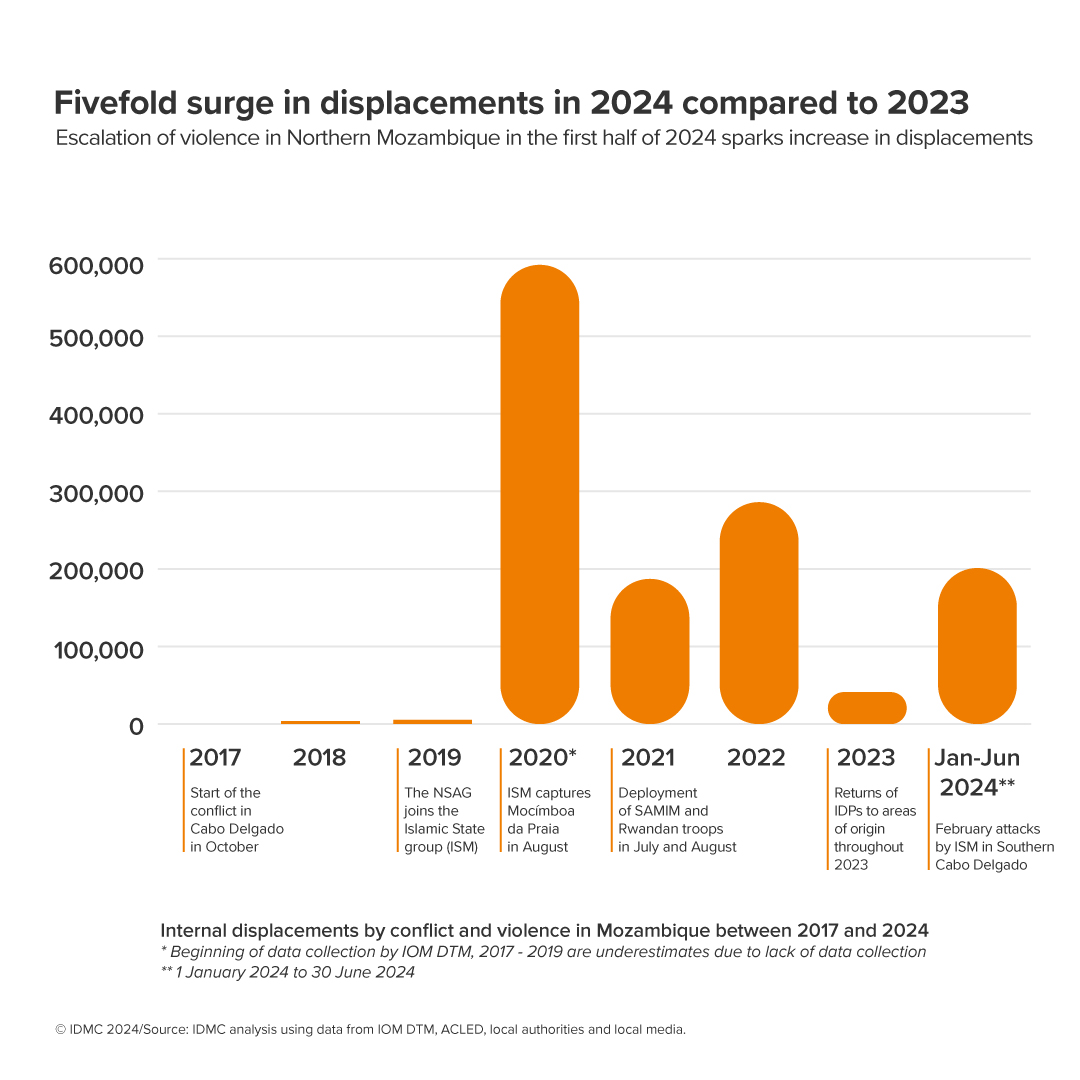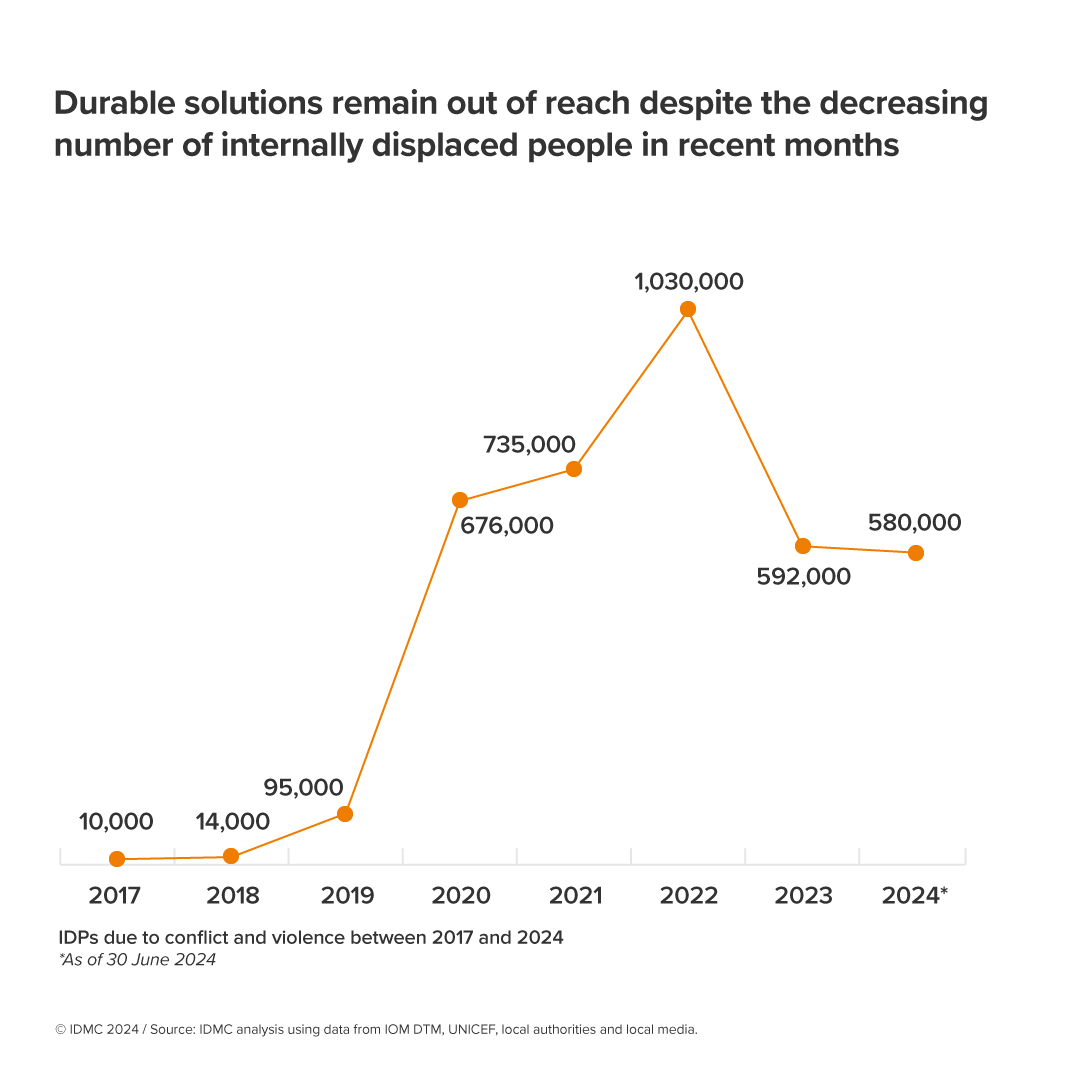
Expert analysis
10 October 2024
7 years into the conflict, solutions to displacement in Cabo Delgado remain elusive
Seven years into the conflict in Cabo Delgado, Mozambique’s northernmost province, internally displaced people, host communities and those who have returned home continue to struggle due to limited access to healthcare, livelihoods, and education.
The conflict began on 5 October 2017 when a non-state armed group (NSAG), now known as the Islamic State Mozambique, launched a series of attacks on police stations in the port town of Mocímboa da Praia and occupied the city for two days. Since the onset of the conflict, over 1.3 million internal displacements have been reported in northern Mozambique.
The conflict has competing narratives on its origins, but the discovery of rubies and natural gas deposits in the region and the governance of these resources is widely understood as having played a role in its escalation.
Waves of displacement and impacts on internally displaced people
The first years of the conflict were marked by sporadic attacks in the country’s northern provinces, with around 9,000 internal displacements recorded from 2017 to 2019. In 2020, repeated attacks in the city of Mocímboa da Praia, in northern Cabo Delgado, led to the fall of the city to the NSAG and to around 592,000 internal displacements that year alone, an exponential increase compared to previous years. Mocímboa da Praia remained under the control of the group for one year, until August 2021.

Another significant surge in conflict in southern Cabo Delgado beginning in June 2022 triggered over 286,000 movements of people that year, the second highest number of internal displacements linked to the conflict. The attacks in southern Cabo Delgado renewed the feeling of insecurity for both the population and humanitarian organizations.
2023, on the other hand, was marked by considerably lower levels of conflict, which led to an 86 per cent decrease in movements compared to 2022. This decrease is largely due to security improvements following operations conducted by troops from Mozambique, the Southern Africa Development Community Mission in Mozambique (SAMIM), and Rwanda.
All these waves of displacement in Cabo Delgado have led to loss of livelihoods and increased vulnerabilities among internally displaced people (IDPs). The displaced population, most living in the southern parts of the province, has faced several challenges, including family separation, mental distress and lack of civil documentation needed for access to essential services. Their needs are urgent and manifold, ranging from shelter, food and security to access to healthcare and education.
Durable solutions increasingly out of reach amid escalating conflict in 2024
The perceived improved security situation in 2023 and trend of increasing returns of IDPs was reversed when the NSAG attacked several villages in southern Cabo Delgado in February 2024, triggering 96,000 internal displacements and leading to a large outflow of people into the neighboring Nampula province. This represented the most significant attack in the district of Chiúre since the start of the conflict in 2017. The group burned churches, homes, schools, and government buildings, forcing the local population to flee.
In total, from January to June 2024, the escalation of conflict triggered nearly five times (201,000) more internal displacements than in all of 2023 (41,000).
Another attack in April 2024 triggered nearly 50,000 displacements. Around the same time, neighboring Botswana, Lesotho, Namibia, and Angola began to withdraw their troops serving with the SAMIM, diminishing the remaining forces in the region.
In total, from January to June 2024, the escalation of conflict triggered nearly five times (201,000) more internal displacements than in all of 2023 (41,000). It also led to secondary or tertiary displacements as 79 per cent of the IDPs in the country have been displaced more than once. As of June 2024, 580,000 people were living in internal displacement due to conflict and violence in Mozambique, 93 per cent of them in Cabo Delgado province.

Returnees need shelter and access to basic services
Since the onset of the conflict, over 610,000 displaced people have returned to their communities of origin or former habitual residence. Nonetheless, returnees still face difficulties and need support to rebuild their lives. Most of the key infrastructure in areas of return is still not functioning and communities’ access to healthcare, livelihood opportunities, and education is limited.
Nonetheless, returnees still face difficulties and need support to rebuild their lives.
In addition, people often funded their return themselves, depleting their financial resources, and were driven to return home by poor conditions and lack of humanitarian assistance in IDP sites, which served as a significant push factor for the abrupt return of IDPs.
As the region is also prone to disasters such as storms and cyclones during the rainy season, returns have been even more challenging. Despite the reduction of people living in internal displacement, durable solutions are yet to be reached, as most of the returnees have as many needs as IDPs themselves and the majority do not meet the eight criteria of the IASC Framework for Durable Solutions, which establishes when a durable solution is achieved.
Finding solutions for displacement affected communities
Bilateral agreements with the Rwandan and Tanzanian governments are expected to compensate the end of the SAMIM mission in July 2024, but maintaining security and stability across Cabo Delgado remains a challenge. Despite several returns and a significant decrease in the number of people living in internal displacement as of June 2024, the lack of access to services and opportunities in the communities of origin prevents returnees from reaching durable solutions. Thus, both IDPs and returnees are at a crossroads as both need humanitarian assistance.
People who have returned home or seeking another durable solution, either remaining and integrating in the host community or relocating to a new place, will not be able to rebuild their lives without a comprehensive response. Humanitarian assistance to address the immediate needs of people needs to be accompanied by stabilization and development efforts.
The 2021-2024 Cabo Delgado Reconstruction Plan, focusing on rebuilding roads, telecommunication infrastructure, health facilities and schools in the conflict-affected province, is a notable initiative in that regard. However, due to the increased insecurity in 2024, the reconstruction efforts are on hold and delayed in many parts.
Addressing the underlying drivers of displacement, promoting social cohesion, investing in the reconstruction and development of conflict-affected areas, and ensuring security for development actors are key to long-term solutions for those affected by the conflict.
Photo: NRC/Karl Schembri
